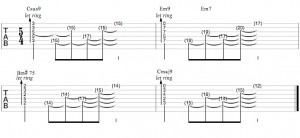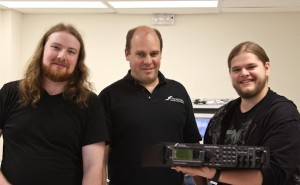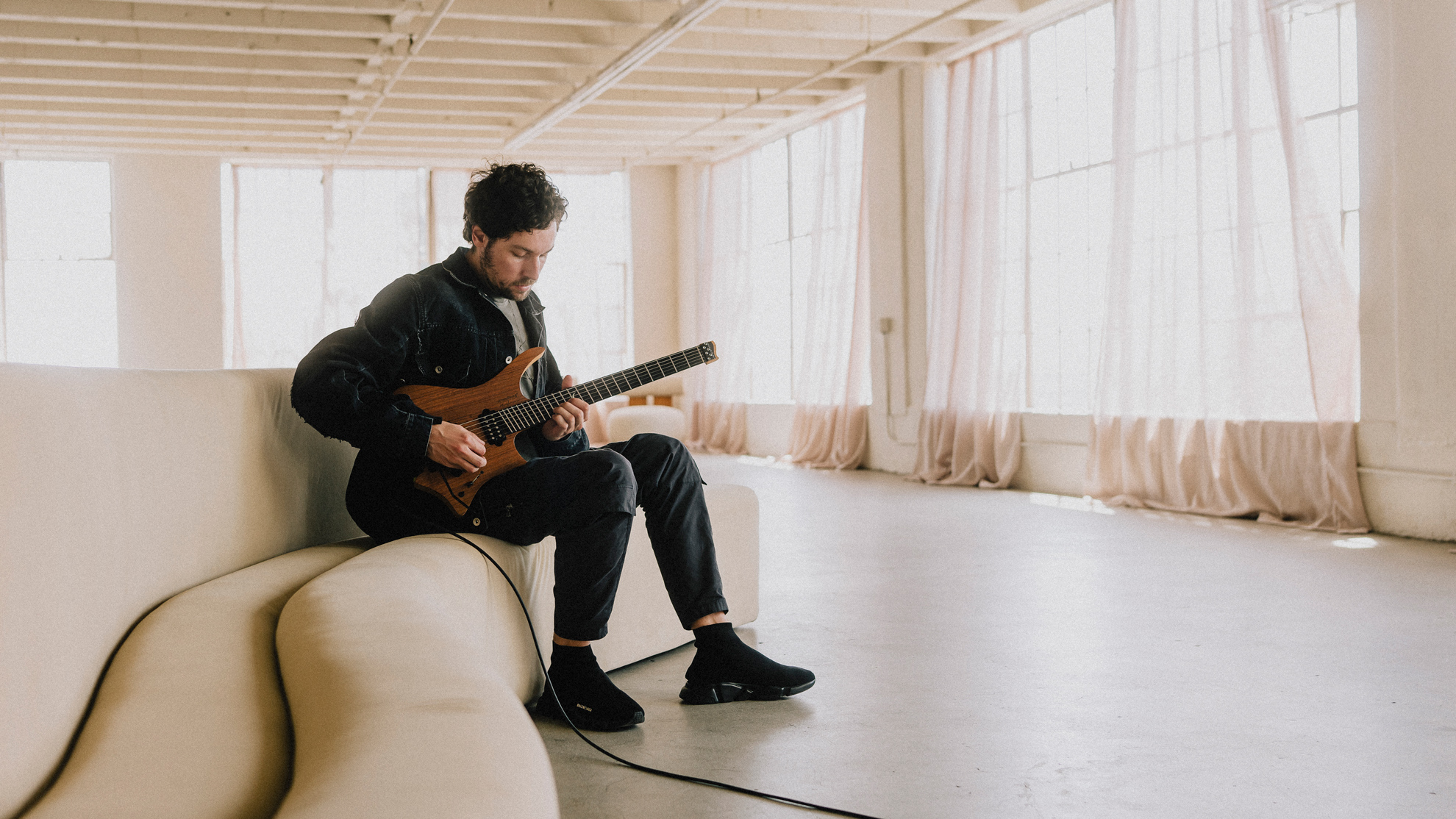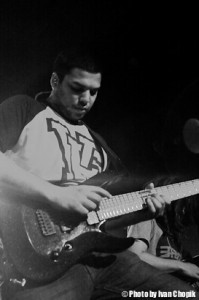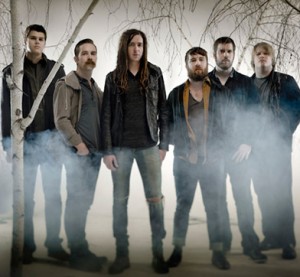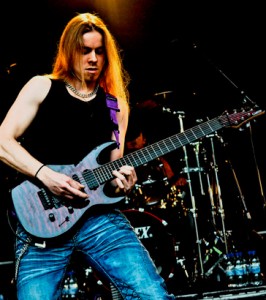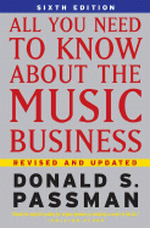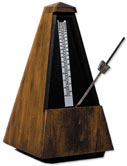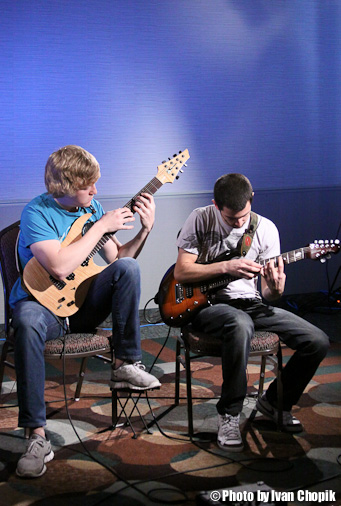
Chris Letchford & Travis LeVrier
Modern prog instrumentalists Travis LeVrier and Chris Letchford of Scale the Summit discuss their new album The Collective as they unfold a new and exciting chapter for the group. Putting their current standing into perspective, Chris and Travis reminisce on the time they’ve shared as a band, touching upon the major facets of their story and recounting tales of tours past.
I spoke with Chris and Travis before the duo hit the stage for the Worcester, Massachusetts date of their tour with Periphery and Fair to Midland.
JA: You guys are on tour right now with Periphery and Fair to Midland. How is that going for you?
CL: It’s going really well. The last couple of shows actually sold out – good crowd every night. All the guys in both bands are really fun. If anyone’s seen videos of Periphery they know they’re a bunch of jokesters, so it’s a lot of fun touring with those guys.
JA: How has this tour differed from others in the past?
CL: Smaller, I guess, just in size. But the one before this, we toured with Between the Buried and Me, Cynic, and Devin Townsend, and the one before that was with Dream Theater. You can’t really get much bigger than that in the progressive world. [laughs] But it’s still fun – it’s still nice to play the big venues, but it’s also fun to play the smaller venues and the more intimate venues, where you’re closer and you get more of the vibe from the crowd and stuff like that.
JA: You guys were all based in L.A. and met at Musicians Institute. Can you tell us more about [how you got started as a band]?
TL: Well, Chris and I grew up together in Houston, and we started playing guitar together in 2004. Chris was already enrolled to Musicians Institute to start later that year and he just convinced me to go with him. I didn’t have much going on at the time either, so I was like, ‘Yeah, it’s a great idea.’ So we moved out there, and we took two years worth of classes at MI and we had been writing music together and ended up finding our drummer and bass player, Pat [Skeffington] and Jordan [Eberhardt], at MI. Everything worked out really nice. We just started jamming together, recorded a four-song demo, and started playing shows around LA. School was coming to an end and we knew that we really couldn’t pursue the band full-time living in LA, or that it would be a very big struggle. So we convinced Pat and Jordan, who we had only known for a little over a year, to move out of state back to Houston with us. We had a whole plan outlined, and we’ve pretty much done everything that we said we were going to do.
JA: How did you guys handle self-promotion in the beginning?
CL: For one, we’ve actually done over 3,000 hand-written demos that we passed out when we first started that we all took turns handwriting. But the cool story about it that I was telling the kid who gave me a demo at one of our shows is this: a year before we got the Dream Theater tour, the guys went to a Dream Theater show in Houston and were passing out demos of Monument, our first record. And then a year later, we were on tour. It’s kind of a neat story, and it just proves that hard work and persistence will really pay off.
As far as promos, like every band now, we took advantage of the Internet with Facebook and Myspace and PureVolume and just promoting. That’s really all it is. It’s just that, and interacting with your fans. We interact with our fans probably more than most bands do.
I write back everyone on YouTube and Facebook and everything, and every email we get gets a response and stuff like that. You just have to show that you care, which we do. We come out every night after shows and interact with fans and talk about guitars and all that stuff and it’s a lot of fun.
JA: Let’s talk about your new album The Collective. What does the title mean and how is it reflected in the music?
CL: We spend a lot of time titling songs, and then when it comes down to the record, we’re actually even more picky, because it’s the collaboration of the entire thing as a whole. We’d kind of done the organic nature thing for a while, and decided not to go super direct way even though it’s still organic – and I’ll explain that as well – but The Collective as a whole is just a bunch of small pieces put together, and it forms one larger mass. That’s kind of what we’re going for as far the new record, because it was a little darker and not all of our songs were strictly nature-related like they normally are. But we wanted something just to describe it as a whole.
With The Collective, the spiral on the cover art is called the phyllotaxis spiral. What it is, is just plants – certain kinds of plants will grow in a certain kind of spiral and when you take an on-top shot of it, a bunch of the small, little pieces form this spiral shape, which is kind of where we got [the idea for the name] The Collective. So being that we’re all about organic and nature-themed stuff we still wanted to keep it organic. The phyllotaxis spiral is actually what my web guy came up with for that and it worked perfectly. I was stressing a lot about the cover art, because we wanted it to be still Scale the Summit-themed and still have the same kind of vibe, the organic nature vibe. It ties in indirectly, but it’s still nature-related. So it was kind of cool how that one came out. He really saved me on that one.
JA: Did you have a team of artists collaborating to on this?
CL: Well, it was me and the guy who did all my websites, and he did the organization of the font and stuff for Carving Desert Canyons – but that was real photography from a guy in Houston named Tom Kilty. On the new one we wanted to go to not just straight photography, but try actual art. So he basically came up with the idea and I loved it, and I said this and that and he’d send it to me and we’d give him our opinions of stuff we wanted to change – it wasn’t very much. He’s got such a good eye, and me and him are so in tune as far as knowing exactly what each other wants. It was actually a pretty easy process.
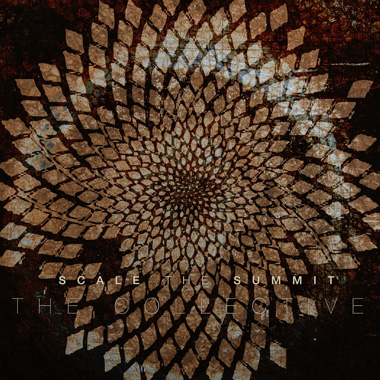
JA: Why don’t we talk about the process you guys went through in the making of the album writing and recording-wise. Has this been different from other albums in the past?
CL: It was actually quicker this time. We started everything with guitars first. The guitars were written from start to finish pretty much and we’d change a little stuff here and there when we started adding drums and bass. But for the most part, when guitars are done, I give it to Jordan and Pat and kind of explain to them what we’re thinking as far as quiet here, loud there, fast-paced here and this and that, and then explain to Jordan for bass lines to maybe go this route. I think we’re all on the same page now, being on our third record, and it went a little easier this time because we didn’t really have to communicate as much – we’d just give it to him, he learns it, and writes his bass lines and Pat writes his drum parts.
So what we did this time was we would give him one song and then like a week later, we’d all meet up and play it together and kind of talk about what we want to change or fix or add or delete or whatever. It really went more smoothly than most bands you hear about, arguing and stuff. We don’t really argue when it comes to songwriting, it’s just kind of a smooth process. And like I said, we all have the same influences, we’re all on the same page now after three records. It’s just a smooth process and it’s actually kind of relaxing and fun to write.
And with recording, we recorded at Audio Hammer with Mark Lewis who did Devil Driver and All That Remains. So it was a little bit more metal but I just wanted a bigger production – our last one was a little bit flat in my opinion and lacked a lot of dynamics, and I wanted something with a bigger heavy-hitting sound to capture the heaviness that we wrote. Especially on the new record, there are a lot more heavy parts. So we were attracted to him, and he was a fellow guitar player so it made getting guitar tones and dialing in everything perfectly a lot easier. And him and Jason Suecof, who runs Audio Hammer, are both really sharp guys when it comes to production. So I think we can all agree that we got exactly what we wanted as far as that goes.
TL: One different thing we did during the recording process – on both our previous albums – was that whoever decided to start, like Chris, would normally start and go for however long he could take, tracking like four or five hours or whatever. This time we just decided to take it song by song which was Mark’s idea. So basically we would start with one song and Chris would record his parts, I’d record my parts, and then move onto Jordan and obviously all the drums are tracked.
CL: We had to do scratch guitar [tracks] so that Pat could track to those. So that way he at least knows where he’s at, because with our music it’s a little bit more tricky than just verse, chorus, verse. It was really smooth though, I think because Mark is really good at what he does. He records bands 24/7 all year long with no breaks. So when we get in there and once we get going, it’s like hitting the space bar constantly.
TL: But recording in the way I just mentioned, it kind of gave each member a little bit of time to take a break and breathe instead of tracking for hours at a time and really just tiring yourself out. And so, like Chris said, it was pretty smooth.

JA: Could you describe any influences as far as other artists or people that you’ve toured with that went into this album?
CL: Well when I’m writing, I actually like to not listen to a lot of music because I feel like when you’re listening to a lot of music, then a lot of influence from other bands’ songs will either subconsciously or on purpose come out in your writing. So I just like to keep my head clear. Plus – knock on wood – I have a really quick writing process and when I sit down and write, I just write and write and write with little effort. And seriously – knock on wood – hopefully that never goes away because I don’t want to jinx my writing process. [laughs]
But when it comes down to it, I really just like to keep my head clear as far as other ideas from other bands and stuff like that. I mean, there are bands that we all like. My favorite guitar player is Guthrie Govan, and he definitely makes me strive to want to be a better guitar player for sure because he’s a great player, a good songwriter, and a fantastic improv player. I’m sure Jordan and Pat can probably tell you they have certain influences from certain other bands when they’re writing their drums and their bass parts. But as far as guitars, I really like to keep it so that it’s more us than somebody else. Though that’s not a very good answer. [laughs]
JA: Why don’t we talk gear for a little bit? What are you guys using right now on the road and in the studio, and is it different from what you guys have been experimenting with in the past?
CL: Me and Travis just switched over to Axe-Fx, so we’re both using that live running direct. We still use our Mesa Boogie cabs and what we used to use was all tube amps. We were on Engl Powerballs for like five years and then we switched to Mesa Boogie Mark V. And after the Dream Theater tour of course, hearing the Mark V every night with [John] Petrucci as our idol, it was like, ‘Time to get one!’ [laughs] So we got one and then the Axe-Fx began to really widdle its way in there, because Dweezil Zappa on the Dream Theater tour was using them.
And then when we did the [tour with] Cynic, BTBAM, and Devin [Townsend], Devin and Cynic both were using Fractals and I was like, ‘Man, it just seems convenient because you get to eliminate massive pedal boards and not have to pedal dance the entire time you’re playing.’ With our music, it’s hard enough just to switch to a lead boost from the technical riffs that we’re playing right into solos. So, it was really nice. Now we can switch up and have a bunch of new sounds. So far it’s cleaned up our live sound. We’ve had more compliments about our live tone than ever because running direct, you don’t have a mic which comes out to a P.A. for the audience. So what the audience hears is just clear, direct sound coming out of the P.A. right from the guitar. So it’s nice. Pat just switched over and got a new Tama kit and Jordan is still running his Eden bass gear.
TL: And as far as in the studio, we had actually only gotten the Axe-Fx a little bit before the studio, so we didn’t have a lot of time to really mess with it and dial it in, but we used a combination of different amps. We used a Bogner Uberschall for a lot of the rhythm tones and an [EVH] 515o III for some of the rhythm parts and a hot-rodded [Marshall] JCM 800 for all the leads that Mark had in the studio, which was really tasty sounding.
CL: That thing was just, turn it on, and it’s just ready to go.
TL: It was amazing. And for the clean stuff we used some of the Axe-Fx actually just direct in to Protools. And obviously for any of the effects, we used Axe-Fx. It worked out quite nice.
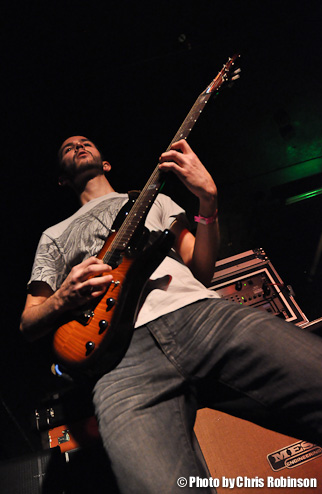
JA: Could you describe some of the patch settings you used on the Axe-Fx?
CL: I wrote fifteen patches after we got out of the studio. Basically, we did the record then got out. And then, I went through and just wrote patches to all the different sounds. And I want to say we used an Orange.
TL: Direct to Orange for the dirty rhythm channels.
CL: We’ve made the patches a while ago now and I haven’t even looked at them since but with a lot of the other stuff, we’ve taken a lot of the presets and altered them as well. [laughs] The ‘Whales’ effect was derived from – I think it was called Ganymede or something like that. It was close to the end, but we took a lot of them and just altered them. I think for all the distortion, we just used the Orange and for clean…
TL: I think it was the USA Clean.
CL: Yeah, it started with that.
TL: Honestly, we don’t have too much crazy stuff going on. We kind of keep it somewhat simple.
JA: A lot of people, they’ll say that when you become proficient enough as an artist, you eventually get into this ‘reckless abandon’ kind of mindset so much that in the middle of performing you have the ability to surprise yourself and the audience. What would you say is your greatest element of surprise in performance?
CL: We’re not too much of like crazy dudes, but I’d say we like to play everything note for note. So we practice a lot and I’d say most people are surprised that it sounds like the album and we… I don’t want to say barely make mistakes. I don’t want to jinx the show tonight but we do practice a lot. [laughs] Out of all the tours we’ve done, it’s really rare to see other bands warm up. I thought more bands warmed up. But we spend like an hour everyday warming up before we play as much as we can. Sometimes the shows are rushed, and we only get ten or fifteen minutes to warm up.
As far as surprises – on this tour, I actually found myself talking a little trash to the audience, not instigating them and they’re not being mean to us, but in a fun way. I remember right before we talked about the song ‘Drifting Figures’ in Bakersfield, some kid touched my guitar and while I was trying to talk in the mic, he’s sitting there pushing my headstock back. I remember going like, ‘This song’s called ‘Drifting Figures’ – don’t touch my guitar!’ [laughs] But it was so quick – when it comes to me talking, I’m really good with my improv, as far as being really quick to respond to someone. So then, I hear everybody laughing because of the really quiet part of the song. And then there was some other stuff, like the lights were too bright, so I was saying that the audience was complaining that the lights were too bright and that they were too hot so I was blaming everything on the first couple of people in the front and they were all yelling. That was a lot of fun.
I think people think that we’re super serious and just very straightforward as far as just our guitar playing, but we joke around and we have a lot of fun. So we’ll see what happens tonight. It all just depends on the audience. And if they give me some, then I’m going to take a lot. If they give us the tiniest little bit of room to mess with them, then I’ll definitely do it… thanks to Devin Townsend I guess. He was probably a bad influence on us when it comes to messing with the crowd, because he does it better than anybody that I’ve ever seen.
 I saw him with Strapping Young Lad and it was the angry Devin Townsend then and that was almost ten years ago now. He was just trash-talking to the crowd and really getting them fired up. And now, it’s like a totally different Devin – it’s like the jokester Devin. He just says some nuts, outrageous stuff on stage, and he just blew my mind, because he’s improvising every night. And you never know what he’s going to say. Every night was just shocking, it would be like, ‘What did he just say?’ We’d be sitting backstage and we’d have to run out there to see the crowd’s response. So we’ll see, I’m sure it’ll get worse over time as I get older and less nervous on stage.
I saw him with Strapping Young Lad and it was the angry Devin Townsend then and that was almost ten years ago now. He was just trash-talking to the crowd and really getting them fired up. And now, it’s like a totally different Devin – it’s like the jokester Devin. He just says some nuts, outrageous stuff on stage, and he just blew my mind, because he’s improvising every night. And you never know what he’s going to say. Every night was just shocking, it would be like, ‘What did he just say?’ We’d be sitting backstage and we’d have to run out there to see the crowd’s response. So we’ll see, I’m sure it’ll get worse over time as I get older and less nervous on stage.
JA: What can we expect in the future from Scale the Summit as far as sound and things you guys will be putting out?
CL: Well, we’ll never write the same record, I’ll tell you that. A lot of people were shocked that the new record was a lot darker. But what I’ve told every interview we’ve done so far is that we’re not going to write the same record. I’m not going to write Carving Desert Canyons II, III, IV, and V. We’re always going to keep our same epic, happy journey vibe. But with the new one, I think it just happened. But that’s the cool thing about being instrumental: we can kind of do whatever we want, because we’re not just a metal band with a screamer to where we got to have those riffs so he can scream. We can just chill out like we did on the end of ‘Whales’ where it gets all jazzy.
TL: We’re not really pigeonholed, I guess you could say. We can pretty much go wherever – what direction we choose to. And on the new record, we definitely explored some darker territories, which we’ve never done before, and fans seem to be enjoying it.
CL: It’s just a different change of pace. It’s not just the fact that it took people off guard, it’s just a totally different vibe altogether. It’s a lot mellower and it’s a little bit more down tempo, but as we get older as just people, our sound is definitely going to change and evolve on its own without us thinking about it. So it’ll be exciting to see what we do on the next record. I’m always writing so I’ve already started working on stuff for our next CD because I don’t like getting pressured into having to write with a timed schedule. Right now, it’s different even from what we just released so we’ll see what happens. I don’t think we’ll ever shock anybody though. [laughs] I don’t think that’s ever going to happen. We’ll see though. Who knows?
JA: You described your new album as much darker and gloomier. What prompted you to get in with that tide?
CL: I don’t know. It just kind of happened. Before Carving Desert Canyons came out, what we’re going to do for the lesson today, ‘The Levitated,’ is darker and I actually wrote that and ‘Immersion’ before Carving Desert Canyons even came out. The last song we worked on for Carving Desert Canyons was ‘Sargasso Sea’ and that was actually the darkest, I think, of that entire record. So I feel like I was already venturing off into darker tones. I’m not really sure why. I don’t think I was listening to anything that was darker at the time.
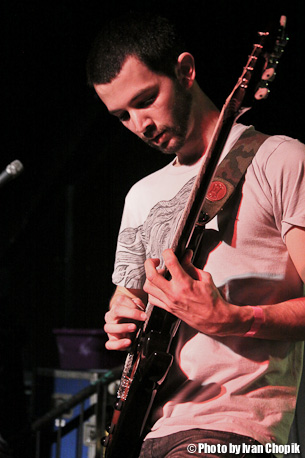 TL: I know you did mention one thing: we have a lot of clean tapping stuff that we’re kind of known for and most of the stuff we’ve done like that has been more major, happy sounding. Chris definitely did mention to me at one time that he wanted to keep that same theme but just make it different, make it darker, make it more minor.
TL: I know you did mention one thing: we have a lot of clean tapping stuff that we’re kind of known for and most of the stuff we’ve done like that has been more major, happy sounding. Chris definitely did mention to me at one time that he wanted to keep that same theme but just make it different, make it darker, make it more minor.
JA: Would you care to mention any bands that you would like to see with you on tour?
TL: Well, I don’t know about opening up for us but as [far as] bands we’d like to support on the road, just to name a few, would be The Deftones, Opeth, Minus the Bear – we’d like to branch out a little bit from the metal scene. Obviously Steve Vai or Joe Satriani would be absolutely incredible.
CL: Mastodon, especially with the new record. We’d like to tour with Baroness and Dream Theater again –
TL: In Europe. [laughs]
CL: Yeah, in Europe. We wish would’ve gotten the Progressive Nation in Europe. We also had the invite to South America, but funding was not where it is because you have to fly from city to city there. That gets kind of intense with four band members, and you have to rent gear and all that. We get so many requests for Animals as Leaders – that one is going to have to happen eventually. We know Tosin [Abasi] and we know all the guys in Animals as Leaders now.
But I’ve known Tosin a while through when he was playing with Reflux. We just kept in contact through the Internet and we’d see each other when we’d come through on tour. That’s one tour that we’re kind of avoiding at the moment because we’re both doing our own thing, but it’s one that we’ve talked to our label about and it’s going to have to happen regardless of when and who is trying to stop it from happening. That tour has to happen eventually. It’s just a must.
TL: We’d also love to tour with Devin Townsend again because that was so much fun. Those would probably be our top choices. Hopefully that’ll happen sometime in the future.
JA: What would you say as far as advice to other bands trying to follow in your footsteps, trying to do what you guys did?
CL: Actually, believe it or not, on this tour every other show had an instrumental band opening, which I found to be amazing, because when we were first starting out, we couldn’t even get clubs to write us back. They would be like, ‘Oh, instrumental? Oh no. They’ll never draw anybody.’ Now look at all we’ve done. Now we have clubs that actually write us asking us to do our own headlining shows at their venues. And now it’s like, ‘No. You had your chance when we wanted help. No.’ [laughs] But most of them are Houston venues and stuff like that, and we’ve definitely come a long way.
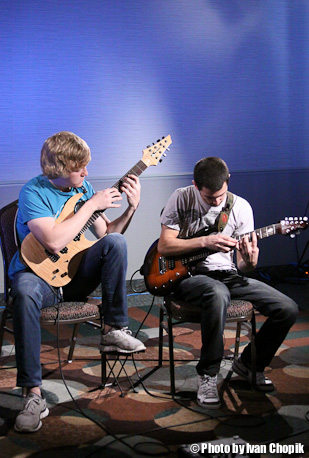
Chris Letchford, John Anderson, Travis LeVrier
But as far as advice – you have to constantly promote and constantly be practicing and writing. The band has to be 100% of your life to really have a chance. It’s hard – I know some people do it – but it’s hard to have a full-time job and to also run a band. It’s just not possible. When we moved back from LA to pursue the band, I told myself, ‘I’m just going to teach lessons, so I can make a better income and work a lot less hours, that way I can have all the time in the world to spend on the band.’ That’s exactly what me and him [Travis] did when we got back. That way we had time and [resources] we needed to work [on the band] for no money for the first few years to really get it going.
And it’s like I said, we did 3,000 hand-written demos – you just pass them out. You never know whose hands it’s going to end up in. And just playing a lot of shows, tightening up your live sound. I think the hardest thing for most bands is just to be able to write songs that people are going to like. You never know. When we started M.I., we had so many doubters just on the fact that we were instrumental. And whether if it’s instrumental or not, the best advice is you just have to work 24/7 on your band. You have to dedicate your life to it.
And now with the Internet, there are so many free marketing tools on the web that you can take advantage of, and if you don’t, then you’re missing out on a lot. We owe a lot to being able to promote on the Internet. That was the biggest thing. I couldn’t imagine what it would be like ten years ago when there was no Facebook or Myspace – and Myspace was just coming out a few years after that.
Without that, you had to tour but no instrumental bands were really touring besides guys like Steve Vai and Joe Satriani, but those guys played in bands before that kind of helped get their popularity up some. But that’s all it is, and now we’re at a point where we even feel like we still have a lot of work left and all it is now for us is you have to tour, tour, tour and constantly have to be working. So now we’re going to try and tour as much as we can, and we’ve got definitely a lot of it lined up for throughout the rest of the year, so we’ll see how it goes.
[Special thanks to Chris Robinson for his great intro and camera work.]




